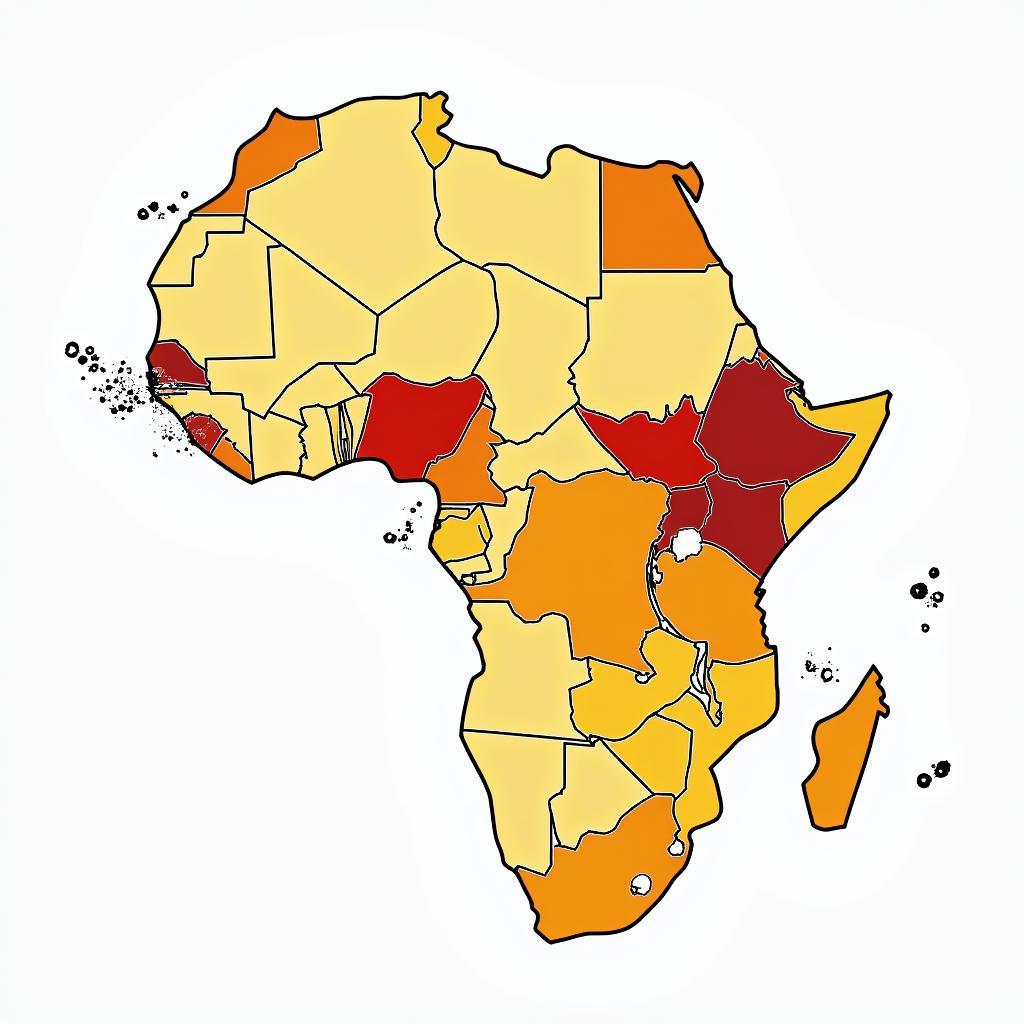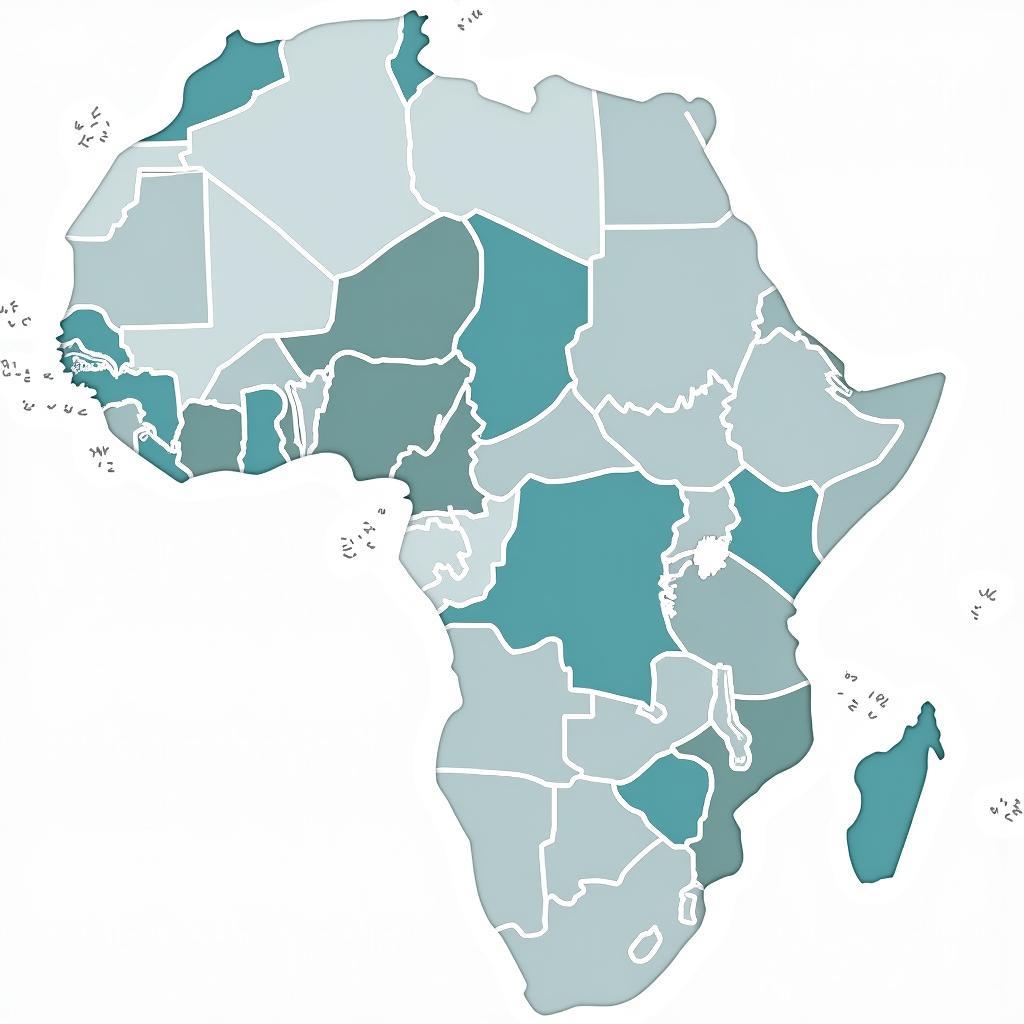Understanding the African Crisis Dataset: A Deep Dive
The term “African Crisis Dataset” refers to a crucial resource used by researchers, policymakers, and organizations to analyze and address the multifaceted challenges facing the African continent. This data encompasses a wide range of indicators, painting a comprehensive picture of crises and informing effective interventions.
Unpacking the Data: What Does it Include?
The African crisis dataset encompasses diverse categories, each offering insights into specific aspects of crises:
- Political Instability and Violence: This includes data on armed conflicts, political violence, terrorism, and government instability.
 Map of Armed Conflicts in Africa
Map of Armed Conflicts in Africa - Economic Vulnerability and Poverty: This category covers data on poverty rates, income inequality, unemployment, inflation, and access to essential resources like water and sanitation.
- Social and Health Challenges: This encompasses data on health indicators such as life expectancy, infant mortality, malnutrition, disease prevalence (including HIV/AIDS and malaria), and access to healthcare.
 Visualizing Healthcare Access Disparities in Africa
Visualizing Healthcare Access Disparities in Africa - Environmental Factors and Climate Change: This includes data on natural disasters (droughts, floods, famines), deforestation, pollution levels, and the impact of climate change on vulnerable communities.
Why is the African Crisis Dataset Important?
The African crisis dataset is more than just numbers; it represents the lives and struggles of millions across the continent. Analyzing this data allows us to:
- Identify Trends and Patterns: By studying historical data, we can identify recurring patterns and predict future crises, allowing for proactive interventions.
- Understand the Root Causes: The dataset helps us delve deeper into the interconnected factors contributing to crises, be it political corruption, economic inequality, or environmental degradation.
- Develop Targeted Solutions: Data-driven insights enable policymakers and organizations to design targeted interventions, ensuring resources reach those most in need.
- Measure Impact and Track Progress: By monitoring changes in the data over time, we can assess the effectiveness of implemented strategies and make necessary adjustments.
Challenges and Limitations of Data Collection
While the African crisis dataset is an invaluable tool, it’s crucial to acknowledge the challenges associated with data collection on the continent:
- Data Scarcity and Inconsistency: In many regions, reliable and up-to-date data is scarce, hindering comprehensive analysis.
- Limited Infrastructure and Resources: Inadequate infrastructure and limited resources often pose significant challenges to data collection efforts.
- Political Instability and Conflict: Armed conflicts and political instability can disrupt data collection processes and raise concerns about data accuracy.
Addressing the Data Gap: Initiatives and Innovations
Recognizing the importance of reliable data, several initiatives are working to address the data gap in Africa:
- Investing in Statistical Capacity Building: Supporting African countries in strengthening their statistical systems and data collection capabilities is crucial.
- Leveraging Technology and Innovation: Utilizing mobile technology, satellite imagery, and big data analytics can improve data collection in remote and challenging environments.
- Promoting Data Sharing and Collaboration: Fostering collaboration between governments, research institutions, and international organizations is essential for sharing data and expertise.
Moving Forward: Data as a Catalyst for Change
The African crisis dataset holds immense potential to drive positive change on the continent. By addressing the data gaps, investing in data analysis, and utilizing data-driven insights, we can work towards a more prosperous and resilient Africa.
Frequently Asked Questions about the African Crisis Dataset
- Where can I access the African crisis dataset? Numerous sources provide access to this data, including international organizations like the World Bank, the United Nations, and research institutions specializing in African studies.
- How often is the data updated? The frequency of updates varies depending on the data source and the specific indicators. Some datasets are updated annually, while others may have more frequent updates.
- Can I use the African crisis dataset for my research? Yes, many datasets are publicly available for research purposes. However, it’s essential to cite the source and acknowledge any usage restrictions.
For further assistance and information, please don’t hesitate to reach out to us. You can contact us at:
- Phone Number: +255768904061
- Email: kaka.mag@gmail.com
- Address: Mbarali DC Mawindi, Kangaga, Tanzania
Our dedicated customer support team is available 24/7 to assist you.

